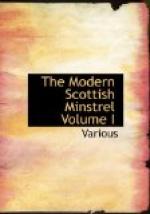V.
She answers with laughter
and haughty disdain—
“To handle my snood
you petition in vain;
Six suitors are mine since
the year thou wert gone,
What art thou, that
thou should’st be the favourite one?
Art
thou sick? Ha, ha, for thy woe!
Art
thou dying for love? Troth, love’s payment
was slow."[98]
VI.
Though my anger may feign
it requites thy disdain,
And vaunts in thy absence,
it threatens in vain—
All in vain! for thy image
in fondness returns,
And o’er thy sweet likeness
expectancy burns;
And
I hope—yes, I hope once more,
Till
my hope waxes high as a tower[99] in its soar.
[95] “Anne”—Rob’s first love, the heroine of the piece. “Similar in interest to the Highland Mary of Burns, is the yellow-haired Anne of Rob Donn.”—“Life,” p. 18.
[96] “Isabel”—the daughter of Ian Macechan, the subject of other verses.
[97] “Unsummon’d of thee.” The idea is rather quaintly expressed in the original thus—“Though thou hast sent me no summons, love has, of his own accord, acted the part of a catchpole (or sheriff’s officer), and will not release me.” Such are the homely fancies introduced into some of the most passionate strains of the Gaelic muse.
[98] Alluding to his absence, and delay in his courtship.
[99] Rather more modest than the classic’s “feriam sidera vertice.”
ISABEL MACKAY—THE MAID ALONE.
TO A PIOBRACH TUNE.
This is one of those lyrics, of which there are many in Gaelic poetry, that are intended to imitate pipe music. They consist of three parts, called Urlar, Siubhal, and Crunluath. The first is a slow, monotonous measure, usually, indeed, a mere repetition of the same words or tones; the second, a livelier or brisker melody, striking into description or narrative; the third, a rapid finale, taxing the reciter’s or performer’s powers to their utmost pitch of expedition. The heroine of the song is the same Isabel who is introduced towards the commencement of the “Forsaken Drover;” and it appears, from other verses in Mackay’s collection, that it was not her fate to be “alone” through life. It is to be understood that when the verses were composed, she was in charge of her father’s extensive pastoral manege, and not a mere milk-maid or dairy-woman.
URLAR.
Isabel Mackay is with the milk
kye,
And Isabel Mackay is alone;
Isabel Mackay is with the milk kye,
And Isabel Mackay is alone, &c.
Seest thou Isabel Mackay with the milk kye,
At the forest foot—and alone?
SIUBHAL.
By the Virgin and Son![100]
Thou bride-lacking one,
If ever thy time
Is coming, begone,
The occasion is prime,
For Isabel Mackay
Is with the milk kye
At the skirts of the forest,
And with her is none.
By the Virgin and Son, &c.




